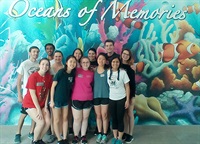
Students in the Integrated Life Sciences Honors College at the University of Maryland (College Park) compete for a limited number of spots in the “Terps Helping Turtles” annual service trip to our hospital. The selection process is challenging, and applicants can’t rely on their sparkling personality. They must submit an essay convincingly articulating why they want to come to the hospital. Successful applicants are those who show that they can grow from the experience, and the eventual team end up being a mix of years. This year the nine accepted to the program were accompanied by Zabrina Anzyl (Assistant Director for ILS) and two “experience leaders,” students returning from the prior year, or years: Nicole has just set a record, completing her fourth year at our hospital!
Once selected the group prepares with a series of pre-trip meetings focusing on sea turtles, and also service project trips concentrating on the environment and conservation. This year the group worked to remove invasive species from a local Maryland park for their pre-trip project and will complete a post-trip project planting trees when they return to school. At the end of each day they spent time in a debriefing session, discussing relevant educational topics and participating in team building exercises.
The students were thrilled to be able to have so much hands-on time with our turtles; feeding, giving baths and helping with the treatments. They soon found out that “turtles have completely different personalities.” Really – they do. They were also impressed with the variety of innovative treatments we use, like cold-laser therapy to facilitate the healing of bone/joint problems and honey to work its magic on open wounds. The consensus was that the experience was one of the most rewarding they’d ever had: “awe-inspiring,” “engaging” and “you can’t believe how magnificent these animals are until you stand beside one of them.” They consistently demonstrated that they were there “to be the most effective we can be in helping the hospital. It’s not about what we want, it’s about what we can do to help you.” All agreed that our turtles do so well in recovery because of the love and care our volunteers pour into the work.
In addition to working at our hospital for the week the group also viewed a turtle necropsy, visited Ft. Fisher Aquarium and spent time at the Cape Fear Raptor Center (arranged by our hospital volunteer Greg Barsanti and conducted by center director Dr. Joni Gnyp.) On Thursday they manned the education stations in our great hall as we welcomed hundreds of students from local elementary schools. It’s not easy keeping young’uns engaged when all they want to do is “see the turtles!” but they did an outstanding job at our educations stations in the great hall.
Thank you Terps, for giving up your spring break to spend time with us and our patients. We expect that we’ll see a few of you back next year.
Hospital opens on limited tour schedule
We’ve reopened to the public on our abbreviated tour schedule. Tour days and hours are Thursdays and Saturdays from 1-4 PM. We will NOT be open for tours on Easter Saturday, April 15th nor on Memorial Day weekend Saturday, May 27th. In June we move to our 5-day-a-week tour schedule. Admission is $5 for adults, $4 for active military and seniors 65+ and $3 for children under 13. The hospital is located at 302 Tortuga Lane in Surf City. From NC 50/210 turn onto Charlie Medlin Dr. (your landmark is Shipwreck Point Mini Golf) and follow it through the roundabout onto Tortuga. Our gift shop is open during tours and we have a lot of exclusive hospital clothing and plush animal merchandise, and lots of sea turtle “stuff.” Come in and meet our turtles and our staff - we all speak fluent sea turtle. And thanks to the Town of Surf City for the improvements to our road! NOTE: we turn off the lights and close our hospital doors promptly at 4:30 PM so please plan your arrival time accordingly.
Dare’s Reef deployment in April
We will be hosting families whose loved ones will be joining several of our patients in the artificial reef dedicated to our beloved turtle “Dare,” a Kemp’s Ridley who died over ten years ago and returned home in her own reef ball. Please visit the website (www.eternalreefs.com) for more information on this green burial option and Dare’s Reef.
Welcome Spring
Winter may finally be over but it left us with several parting gifts – two recently admitted cold-stunned turtles. These little greens somehow survived the wild roller coaster ride of tropical and arctic weather we’ve experienced this year, though not without some problems. One critter is missing his left front flipper; not sure why but it’s an old injury, or maybe he was born that way. The other little guy is wearing barnacles weighing almost as much as he does. Who knows how many more are still out there, so please be on the lookout for any turtle you see stranded on the beach or in marshy areas. It could be a victim of cold-stunning. It may look dead but don’t assume that it is just because it is not moving. Gently pick it up and relocate it to an unheated area like your garage or car. Do not try to warm it up as a quick rise in body temperature will send it into shock. It’s important that the critter not lay exposed on the beach for hours, subject to weather and predators. Call our Director of Beach Operations, Terry Meyer at: 910-470-2880 or Jean at: 910-470-2800. You may also call the State of NC hotline for stranded, sick and injured turtles at: 252-241-7367 (picks up 24/7) or our hospital during operating hours: 910-329-0222. If you are local we will quickly send one of our volunteers to retrieve the turtle for follow-up care at the hospital.



